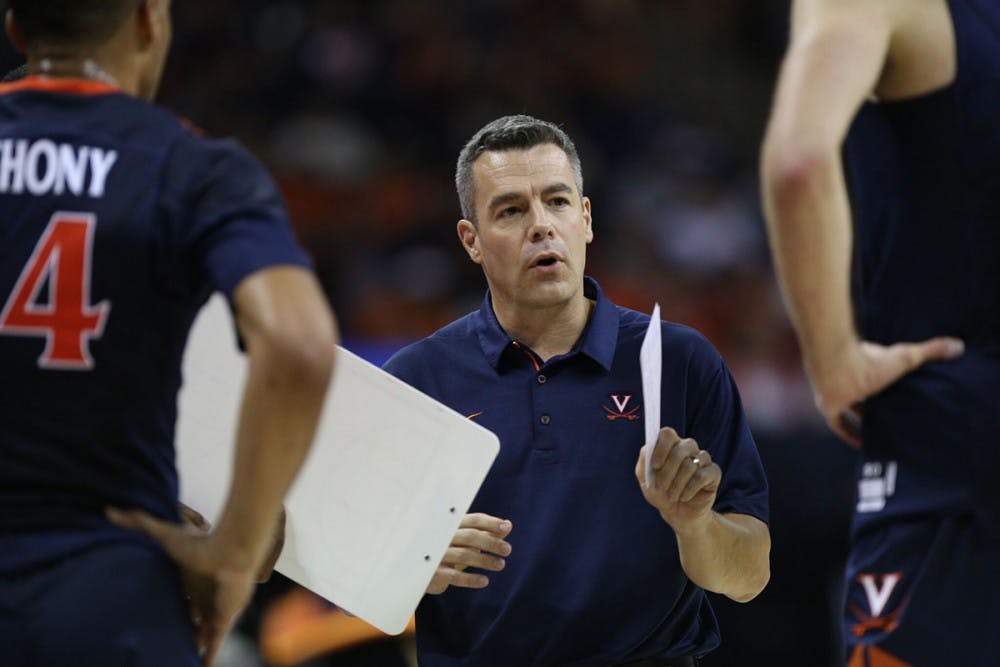Virginia men’s basketball was unanimously voted the best team in the country in the latest AP Poll, a position they have held for the last month. They have undoubtedly the most impressive season in college basketball — the selection committee named them the number one overall seed for a reason. Yet, there still seems to be lingering doubt about their ability to win in March.
“They’ll have a game where they need to score 75 points, and they won’t be able to do it,” ESPN’s bracket expert Joe Lunardi said of the Cavaliers. This criticism is not justified based on Virginia’s play this season — the Cavaliers have put up 75 against potential tournament teams on multiple occasions, including against Louisville in the ACC tournament and have not once given up that many — but instead based on past failures.
While Virginia’s team this year is certainly different than those that have lost in March in years past, this year’s roster occupies the same space in the college basketball landscape as its predecessors — a deep and experienced roster whose strength is defense, attached to a meticulous offense that leads to low scoring affairs.
Despite coming into the NCAA tournament as a top-two seed three of the past four seasons, Virginia has never reached the Final Four. The Cavaliers have never beaten a team ranked higher than a four-seed, and have lost to eighth-seeded Syracuse in 2016 and seventh-seeded Michigan State in 2014 as large favorites.
While any program successful enough to regularly make the tournament can cite failures in March — 67 of the 68 schools that make the tournament leave it in defeat, after all — a lack of a Final Four trip looms large for the reputation of the Bennett era Cavaliers.
Each loss tells part of Virginia’s March story. The Sweet Sixteen loss to Michigan State in 2014 was the first. The one-seeded Cavaliers were inexperienced in March, as the only other appearance of the Tony Bennett era was a first round loss as a 10 seed in the 2012 tournament. The fan base showed out en force, enchanted by a magical run that included an ACC championship. The Cavaliers came tantalizingly close to victory, with a shot in the closing seconds to win it, but ultimately fell in a defensive slugfest.
The 2014 loss to Michigan State was, in a vacuum, a justifiable loss, a hard-fought game lost by a good team to a good team. Losing to Michigan state again in 2015, this time as a heavy favorite, colors its memory. The 2015 team, led by Justin Anderson and Malcolm Brogdon, was as dominant as the team that lost the year prior, but the results were the same, and the start of a pattern could be established.
The following season, it looked as if the Cavaliers might finally find success in March. With an experienced team led again by Brogdon, the first-seeded cavaliers needed only to beat tenth seeded Syracuse to advance to the Final Four. Despite a 16-point lead at half, Virginia collapsed under the Syracuse press, losing in heartbreaking fashion.
The narrative that Virginia chokes in March was no longer limited to talking heads who spew hot takes and the most ardent pace-of-play critics — it became a widely held national belief that Virginia was a January juggernaut who couldn’t handle the bright lights of the tournament.
Last season did Bennett and his team no favors in overcoming that story. The fifth-seeded Cavaliers couldn’t make the second week of the tournament without injured forward Isaiah Wilkins, as they were thoroughly beaten by Florida and put up only 39 points in the process, reinforcing their negative national portrayal.
While it’s both easy and attention-drawing to say Virginia can’t win in a high-stakes tournament setting, Virginia’s two ACC tournament titles over this stretch say that there must have been more tangible drivers behind these losses.
One potential explanation is an over-reliance on individual players offensively. Joe Harris, Brogdon, and London Perrantes were all expected to shoulder the burden for their teams. Brogdon shot 9-40 combined in his three tournament losses, Perrantes went 2-12 against Florida. When those guys went cold, their teams couldn’t recover on the offensive end.
Over-reliance on one scorer is not a problem for this year’s team. Four players average double digit points per game in conference play — sophomore guards Kyle Guy and Ty Jerome, senior guard Devon Hall and redshirt freshman guard De’Andre Hunter. This wasn’t the case for any of Virginia’s other tournament teams.
Another possibility is that Virginia’s slow style leads to fewer possessions. With fewer possessions each one carries more weight, meaning random outcomes on a few possessions become magnified. The Cavaliers move too slowly to build up huge leads even when they dominate play, and a few fluky shots can bring teams back.
The most plausible answer for why Virginia has lost, however — as well as the hardest to stomach for Cavalier fans anxious to prove critics wrong — is that March Madness is just a high variance tournament. The reason fans are so drawn to it is that very unpredictability. The Cavaliers can both be the best team in college basketball this season and fall to Arizona in the Sweet Sixteen if a few bounces don’t go their way, even if the media doesn’t acknowledge the possibility. Good teams lose sometimes.
If he continues to produce high-caliber teams, Tony Bennett will eventually break through to the Final Four. This team is arguably better positioned to do so than any other team he has coached, as talented as those teams were. They may be better positioned than any other team in the country as well — Vegas oddsmakers and statistical models such as FiveThirtyEight believe the Cavaliers are favorites. However, there are no guarantees in March.
Jake Blank is a Senior Sports Editor for The Cavalier Daily. He can be reached at j.blank@cavalierdaily.com or on Twitter at @Jake__33.







